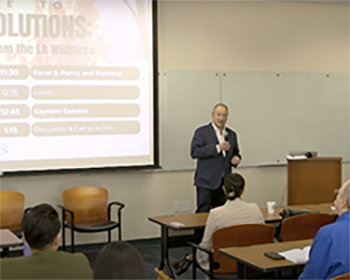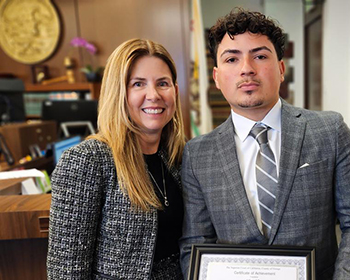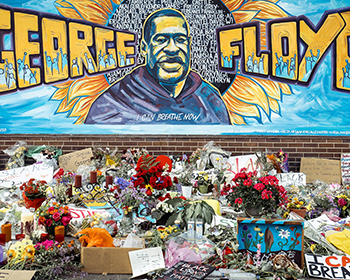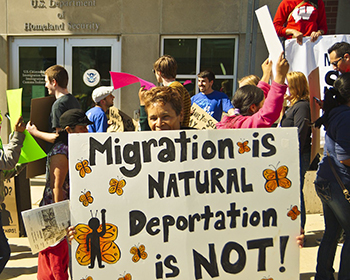As the first and only School of Social Ecology in the nation, our researchers bring real change, in real time, to real people’s lives. Combining the scientific with the practical, we turn hope for change into real solutions that can leave all of us better off. Our research plays a pivotal role in helping solve society’s most pressing problems. Here, we present some examples of our researchers’ work and the impact being made.
SENIOR MOMENTS — Associate Dean and Psychology Professor Susan Charles studies aging and has found surprising ways to savor the senior years. Among them: joining various groups and taking part in myriad activities can lead to happiness. Charles provides tips that policymakers may want to implement to help seniors have more success in their endeavors.
WILDFIRE PREVENTION — Urban Planning & Public Policy Associate Professor Nicola Ulibarrí discusses nationwide wildfire vulnerability data scholars are collecting — information Orange County Fire Authority Division Chief Nick Freeman calls “very important” for fighting and preventing devastating blazes.
FELONY FREE — Young Adult Court is a collaborative court for first-time felony offenders between the ages of 18 and 25. The program helps the participants turn their lives around by providing a second chance to become productive members of society.
THE ROLE OF THE POLL — Dean Jon B. Gould explains the role the School of Social Ecology plays in providing policymakers, activists and the public reliable information via its UCI-OC Poll on the thoughts, feelings and actions of Orange County residents.
Mental health lifelineThree months after a suicide attempt, 17-year-old Chloe cut the ribbon on something extraordinary: a $6.2 million youth wellness center she helped design. At the opening of allcove San Juan Capistrano, the high school senior shared her journey from hospitalization to hope – proving that when young people have a voice in their own mental health care, transformation is possible. The center, operated by the Wellness and Prevention Center in partnership with UC Irvine, represents a revolutionary approach: mental health services designed entirely by the youth who need them most. |
A house of second chancesWhen Abraham first appeared before Judge Maria Hernandez with serious strikes on his criminal record, his future looked bleak. Today, he’s felony-free, playing college football, employed and safely housed. As the first graduate of Orange County’s innovative Young Adult Court, Abraham recently joined program creators to cut the ribbon on California’s first recovery-focused housing site for justice-involved youth. The $1.2 million facility represents eight years of collaboration between UC Irvine, Orangewood Foundation, Orange County Superior Court and community partners to break cycles of incarceration for 18-25 year olds facing felony charges. |
Californians unite across party lines on children’s digital safetyIn today’s polarized world, finding bipartisan agreement seems impossible — except when it comes to protecting children from digital harm. A UC Irvine poll of 2,143 California adults reveals overwhelming cross-party support for stricter tech regulations, from smartphone bans in schools to social media age limits. “There are very few issues with this level of bipartisan support,” say researchers who discovered parents' shared fears about technology’s impact on children’s learning and mental health transcend political divides. |
Orange County’s work revolution: What COVID changed foreverTwo years after the pandemic officially ended, Orange County’s workplace has been permanently transformed. The latest UCI-OC Poll of 800 county adults reveals surprising shifts in remote work preferences, attitudes toward artificial intelligence, and job satisfaction that are reshaping how we think about careers. From executives embracing flexible schedules to workers navigating AI integration, the findings offer crucial insights for anyone trying to understand the county’s evolving economic landscape. |
The AI generation: How California parents really feel about artificial intelligenceArtificial intelligence is reshaping childhood — but are parents ready? A new UC Irvine study exposes Californians’ conflicted relationship with AI’s role in their children’s lives, revealing both excitement about educational benefits and deep anxiety about academic integrity. While many see AI as key to future careers, others worry it’s undermining problem-solving skills. The research uncovers surprising usage patterns and concerns that every parent grappling with technology’s place in education needs to understand. |
When climate anxiety becomes a superpowerIn Lake County, California — one of America’s most wildfire-ravaged regions — researchers discovered something unexpected: climate anxiety might actually save lives. A study of more than 800 residents found that those most stressed about climate change were also most prepared for disasters. “Our findings suggest that a certain level of anxiety about climate change may actually be adaptive,” explains lead researcher Tiffany Junchen Tao, revealing how fear can transform into life-saving action during wildfire season. |
Political earthquake: Trump tumbles as Newsom soars in CaliforniaThe political ground is shifting beneath California’s feet. President Trump’s approval ratings are plummeting while Governor Newsom’s popularity surges, according to an explosive new UCI-OC Poll. But the biggest bombshell? If Kamala Harris entered the gubernatorial race, she’d dominate all other candidates. The findings reveal a dramatic realignment that could reshape California politics and send shockwaves through national campaigns watching the nation’s largest state. |
After the flames: What Orange County must learn from LA’s wildfire crisisThe recent devastating Los Angeles wildfires exposed critical gaps in Southern California’s disaster response — gaps that could prove deadly when the next big fire hits Orange County. UC Irvine experts recently gathered to dissect the failures and forge solutions at “Igniting Solutions: What OC Can Learn from the LA Wildfires.” Their urgent findings reveal the vulnerabilities in our current system and the innovative strategies that could save lives and property when disaster strikes. |
The power of positive emotionsWhat if the secret to preventing heart disease, stroke, and diabetes wasn't found in a pill bottle, but in your daily dose of joy? Sarah Pressman, UC Irvine Professor of psychology, has spent years studying how positive emotions like happiness can literally rewire our stress response and protect our health. Her research reveals practical steps anyone can take to harness the healing power of positivity — and why your emotional state might be your most powerful medicine. |
From felony to freedom: Young Adult Court graduates gain healthy mindset“Young Adult Court didn’t just offer me a second chance — it gave me the guidance and support to build a future I once thought was out of reach,” says Sam Solorio, the program’s 46th graduate. This innovative Orange County court offers something unprecedented: the chance for young felony offenders to completely erase their criminal records. By combining accountability with support, the program is transforming lives. |
The hidden homicides: How Maryland missed 36 police custody deathsA bombshell audit by William C. Thompson, emeritus professor of criminology, law and society, has rocked Maryland’s justice system: 36 deaths in police custody were wrongly classified, hiding what should have been called homicides. The explosive findings prompted Gov. Wes Moore to sign an emergency executive order overhauling how the state investigates in-custody deaths. Thompson’s landmark research exposes systemic failures in death investigations and raises urgent questions about accountability in law enforcement nationwide. |
Cultivating character in the digital ageAs children spend more time online than ever before, a troubling question emerges: Are digital environments bringing out kids’ best qualities — or their worst? Psychology Professor Stephen Schueller is pioneering research to help young people harness technology’s power for character development rather than destruction. His work tackles the urgent challenge facing every parent and educator: how to cultivate virtue in an age when screens dominate childhood. |
Breaking down barriers to affordable housingDespite California’s ambitious policies promoting affordable housing near transit, something’s going wrong. Ajay Garde, professor of urban planning and public policy, discovered that Southern California’s transit-oriented developments are failing to deliver on their promise of accessible, affordable communities. His research exposes the hidden barriers preventing low-income families from accessing well-connected neighborhoods and offers bold solutions that could reshape how we build equitable cities. |
Research finds affordable housing decreases crime, increases property valuesWhen affordable housing opens in Orange County, crime doesn't spike. It plummets. Property values don’t crash. They rise. UC Irvine’s Livable Cities Lab shattered conventional wisdom with data showing Irvine, the county’s affordable housing leader, is America’s safest city. The groundbreaking findings challenge decades of NIMBY fears and reveal why communities should be fighting to attract, not reject, affordable housing. |
Rethinking immigration enforcementAs immigration budgets soar and enforcement intensifies, Charis Kubrin, professor of criminology, law and society, cuts through political noise with hard data about what’s really happening in immigrant communities. Her research for Scholars Strategy Network reveals the hidden human and social costs of current policies, exposing how misguided enforcement strategies are deepening divisions and undermining public safety. The findings challenge both sides of the immigration debate with evidence-based insights. |














